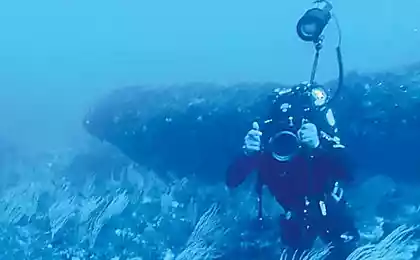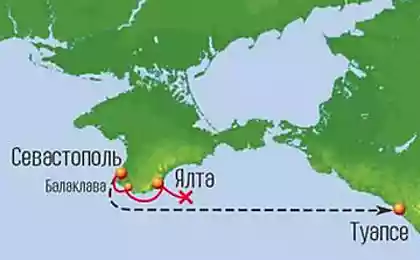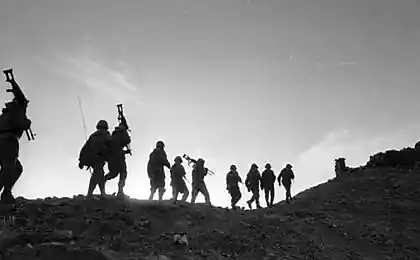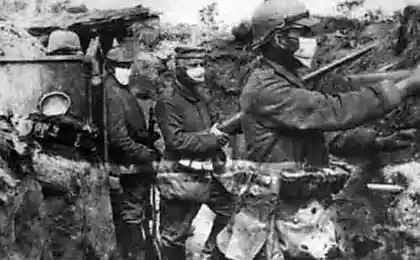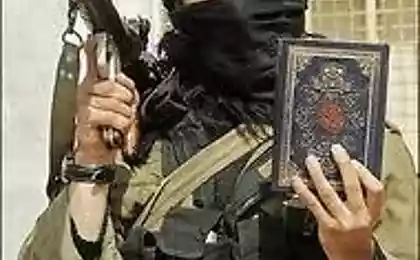790
The North Korean attack on oceanographers
The patronage of a powerful ally can be successfully offset the technical ignorance and military arrogance
All last week the world's attention was again focused on the Korean Peninsula: Yonphёndo near the island in the Yellow Sea, where the disputed dividing line between North and South Korea, there was an armed incident - North Korean military shelled a South Korean island, the Southerners fired back. Calls on Russia to exercise restraint, China offers "six" return to the discussion of the problem of denuclearization, the White House demands that the DPRK "to cease hostilities," and some politicians even talked about the fact that "the time has come to change the regime in North Korea." It has been 65 years since the liberation of Korea from Japanese invaders in 1945, this small peninsula remains essentially problematic region, where time and again into conflict. And about the details of some of them becomes known only decades later. Thus, the incident with the American ship "Pueblo", which occurred in 1968 and almost turned around a major armed conflict involving the United States and the Soviet Union, spoke only five years ago.
January 23, 1968 by North Korean radio broadcast the news of the shootout in the Sea of Japan between the American ship "Pueblo" intruded into the territorial waters of the DPRK and the Korean patrol boats. It is also reported the coordinates of the scene and 39 ° 17'4 '' s. w. and 127 ° 46'9 '' in. d. As the crew of "Pueblo" was the detention of "stiff resistance", the Koreans opened fire. Several people were injured, one killed, about eighty captured. However, the ship was seized by dozens of small arms, anti-aircraft machine guns, thousands of bullets and grenades, a large quantity of spy equipment.
In general, the North Korean naval patrols were known for their aggressiveness, in the case of suspicion they opened fire first, and then negotiated, with whom they deal. In 1960, for example, the DPRK Navy mistakenly fired on Soviet research vessel. Usually this kind of misunderstanding - a violation of warship internal waters of any state - resolved quickly and quietly through diplomatic negotiations. But in the story of "Pueblo" load a completely different scenario.
Today, the American spy ship "Pueblo" captured by North Korean naval patrol in 1968 - one of the main attractions in Pyongyang. North Korea is incredibly proud that Americans humiliated and forced to bear an official apology when those rescues captured by the team. In 2008, the US Senate demanded the return of the ship, but it's hard to believe that the Koreans are willing to lose this magnificent trophy. Photos (Creative Commons license): David Stanley
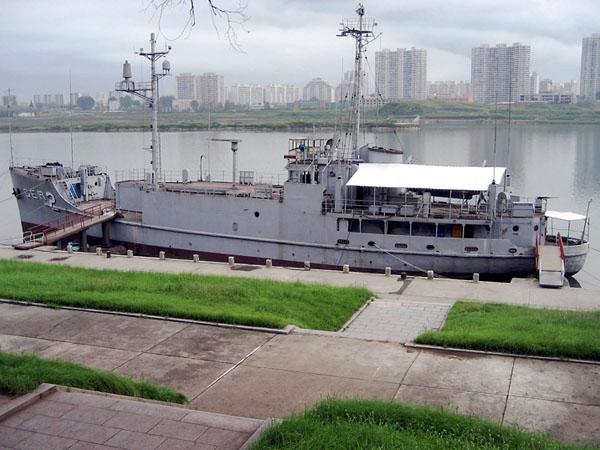
On the same day, January 23, US Ambassador to Moscow, Llewellyn Thompson (Llewellyn E. «Tommy» Thompson Jr., 1904-1972) met with Deputy Minister of Foreign Affairs of the USSR Vasily Vasilievich Kuznetsov (1901-1990) and on behalf of his government requested to assist in the return of the vessel and crew illegally arrested in neutral, he emphasized waters. For Soviet diplomats it was a surprise - Korean comrades are not considered properly inform them about the details of the incident; all that was available at the time - the mean Pyongyang radio message.
It should be borne in mind that at that time, relations between Moscow and Pyongyang were pretty cool, the reason for it - incipient tension between China and the USSR. The Chinese have criticized the foreign policy of the Soviet leadership, accusing him of conspiring with imperialism and rastsenivaya as a betrayal to withdraw the missiles from Cuba. North Korea's leaders have risen to the same position. The United States did not have diplomatic relations with North Korea, however, to resolve the issue of the captured ship, Soviet diplomats advised the Americans to appeal directly to the leadership of North Korea, and our ambassador in Pyongyang was ordered to urgently inform Koreans about the treatment of Thompson and find out further plans Kim Il Sung (1912-1994) regarding this unfortunate incident.
Secret Mission "Pueblo»
Instead of quickly hush up the scandal, through diplomatic channels, Koreans behaved altogether unexpected - the morning of 24 January to Korean radio was handed the captain's record confessions "Pueblo» (USS Pueblo AGER-2) Lloyd Mark Boucher (Lloyd Mark Bucher, 1927-2004) , which speaks directly to the invasion of the vessel into the territorial waters of the DPRK to keep it illegal intelligence activities. A few days later there were also reports of the press conference given by the members of the team for the Korean journalists, where they made their apology over the incident.
Easy cargo ship "Pueblo" at No. FP-344 was launched on April 16, 1944. Until 1954, it was involved in the supply of US troops in the Philippines, after which it was placed on temporary sucks.
Captain "Pueblo" Lloyd Bucher did everything I could, just to avoid a meeting with the North Korean patrol. But the ship did not have enough speed to break away. Noting that on the deck, "Pueblo" burn the documents, the Koreans opened fire. Today, during a tour of the ship, you can see traces of a shootout. Photos (Creative Commons license): Kristoferb
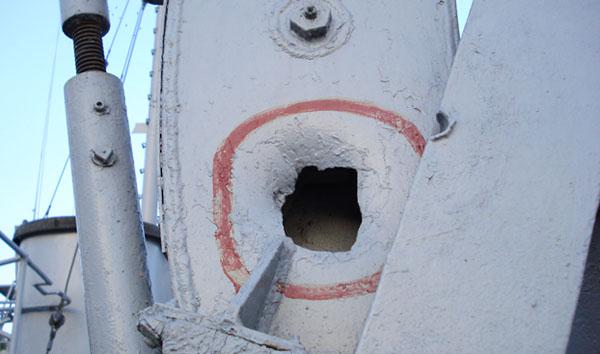
. Until 1954, it was involved in the supply of US troops in the Philippines, after which it was placed on temporary sucks. Ten years later, I remembered about him and decided to use the program in environmental studies AGER (Auxiliary General Enviromental Research), is actually hiding under this abbreviation ships electronic intelligence. Americans interested in military facilities on the territory of the DPRK, the USSR and China: A fixed number of ships, the location of the radar, listen to the radio in order to identify points of command, communications and other military facilities. In 1966, "Pueblo" was renovated: the cargo holds was converted into living quarters and installed at the stern superstructure, which houses electronic equipment.
"Pueblo" was listed in the United States Pacific Fleet, the crew consisted of 83 people: 6 officers, 75 sailors and two civilians - oceanographers Danny Taka (Dunnie R. Tuck) and Harry Iredale (Harry Iredale). December 18 commander docked in the Japanese port of Yokosuka, "Pueblo" was ordered "classified", which identified the timing, objectives and areas of future activity of the ship in the Sea of Japan. The vessel is required no later than 8 January subside from Sasebo-based, follow the Tsushima Strait in the Sea of Japan, and to be in a designated area from 10 to 27 January. Americans are interested in the activities of the Navy in the area of North Korea Chongjin ports, kimchaek, Wonsan and islands Mayando. All of this information was needed in order to calculate whether it is possible "Vietnamese version of" the war in other parts of Asia.
Declassified information caused damage to the reputation of President Johnson: Not only that, with the knowledge of his administration's military intelligence was engaged in illegal activities, as it turned out, the security intelligence command has been neglected, exposing them to unnecessary risk: a dedicated cover for "Pueblo" is not provided, campaign staff officers qualified as "non-hazardous", the ship did not have funds for the destruction of confidential documents and equipment in case of seizure of the ship.
Place of capture "Pueblo". Photo: U.S. Naval Historical Center
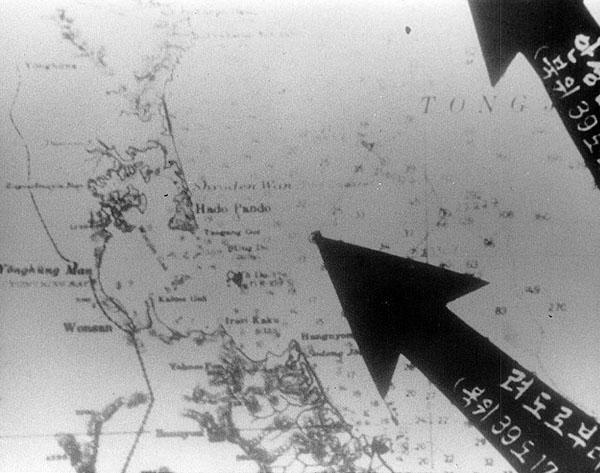
Games Kim Il Sung
After the recognition of Boucher Koreans accused the Americans of spying and demanded a public apology and guarantees that this will not happen again. Responding to wait long - the same day Johnson with the approval of the National Security Council announced the urgent mobilization of a reserve Air Force and the US Navy's total number of 14,600 people. US and South Korean forces were put on high alert, nuclear aircraft carrier «Enterprise» and escorts - sent to the coast of Korea from Okinawa to South Korea was moved several dozen fighter jets the United States. The capture of the American vessel in peace time - unprecedented slap in the face, which can not be left unnoticed. Americans have demanded the immediate return of the vessel and crew and apologize for his internment in neutral waters.
On the same day the US ambassador in Moscow, handed a message from President Johnson's Council of Ministers Chairman Kosygin, expressing the hope that the Soviet government is using all its influence to convince Pyongyang to immediately release the crew of "Pueblo". Finally, Soviet diplomats managed to get some clarification from the Koreans - January 28 during a meeting with the Soviet ambassador Kim Il Sung became clear that the Koreans did not occur exactly fix the place of detention vessel. It became obvious that the interpretation of what is happening Pyongyang is not accurate; ship apparently was not captured in the territorial waters, and it just exacerbates the situation of the DPRK.
During the same meeting, Kim Il Sung made it clear that Pyongyang does not want war, and seeks to resolve the situation peacefully. A similar attitude was adopted by a positive - but subsequent events have caused confusion in the Kremlin: two days later the North Korean government sent a letter containing the request of the DPRK to provide immediate military and other assistance with all means at the disposal of the Soviet Union means if Korea will be in a state of war. It said also that the United States may at any time to go on a military adventure in Korea, so North Korea is forced to prepare for a response.
Photo documents found on board the vessel and presented as proof of the Koreans. These documents confirm that the "Pueblo" still violated the territorial waters of the DPRK, however, before it was caught. Photo: U.S. Naval Historical Center
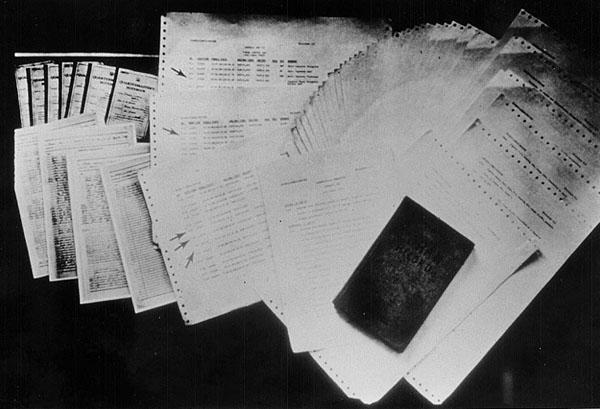
There was every reason to require such support - the fact that between the Soviet Union and North Korea July 6, 1961 for a period of ten years, was signed a treaty of friendship, cooperation and mutual assistance. One of his points was: if one of the parties to armed attack by any State, the other party will immediately render military and other assistance with all means at its disposal. The conditions were tough, no consultation and agreement prior to military assistance, were not provided. By chance, a week before the incident with the "Pueblo" in the Soviet Union came to the conclusion that it is necessary to revise the interpretation of the treaty that the country did not have an automatic involved in undesirable military conflicts. A series of conditions are met: North Korea should not be an agent provocateur of the armed conflict, should not be involved in the conflict under a contract with a third party (China, for example) should not involve the Soviet Union in the conflict with the aim of uniting the country and certainly before we give military aid must undergo diplomatic consultations. January 16 this concept of interpretation of the treaty has been approved, it is going to discuss with the Korean side, but did not have time to do it.
In Korea, the situation continued to escalate. Speaking on the occasion of Army Day, Kim Il Sung said: We do not want war, but we have it and are not afraid. In the capital, began a partial evacuation of the population, has repeatedly declared air raid, the company worked with faults, observed blackout night - cars, for example, went with the headlights off.
The talks between the Americans and the Koreans were without success. Some insisted on apology, others will not hurry to bring them. In addition, the Koreans had tried to organize an exchange of crew "Pueblo" for being in South Korean prisons, leftist politicians. This proved impossible, because in the relations between the US and South Korea appeared chill - the latter expressed dissatisfaction with the very fact of negotiations and an attempt to find a compromise with the DPRK.
Many photographs taken by the Koreans, the crew members, "Pueblo" show bulging middle finger - "Hawaiian good luck" as they explained not understand the significance of this gesture Koreans. In this picture a special "friendliness" showed Angelo Strano (Angelo Strano), second from right in the front row. Photos from the archives of the association
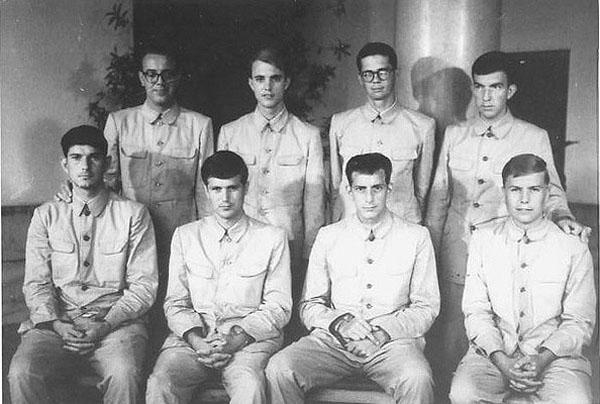
Peaceful conflict resolution, and made every effort to promote in Moscow - Kim Il Sung was invited to the consultations, however, citing the tense situation in the region, he did not find it possible to accept this invitation. But a meeting with Brezhnev was sent to the Minister of National Defense Kim Jang Bong. In Moscow, he clearly formulated the attitude of the USSR to the incident: it's time to turn out the crew of "Pueblo" and cease to escalate the situation. The most important was the question of military assistance under the terms of the 1961 Treaty. Brezhnev specifically focused on the fact that the contract is defensive in nature and in its content and meaning is intended to serve as an instrument of peace in the Far East. During the meeting, the Korean side for the first time was presented a new interpretation of the document.
Many experts are inclined to believe that this conversation in the Kremlin, played a decisive role in the "Pueblo". It became clear that the release of the crew - a matter of time, but eventually the Koreans just did not want to rush. It happened only 23 December 1968, 11 months after the seizure of the vessel. February 3, 1969 Newsweek came out with a portrait of Captain Lloyd Boucher and removal of "Who is to blame?" On the cover. In relation Boucher was conducted an internal investigation, but before the court martial is not reached.
Another interesting point in this story - to become familiar with the technique of espionage, which was stuffed with "Pueblo" in Wonsan a delegation of Soviet specialists in the field of electronics. Korean friends for a long time drove them by the nose - walking their museums, theaters, showing the sights - but when it came to represent the interests of the equipment, it turned out that the Cuban and Chinese comrades already there to work, and dismantle all that was left after the seizure of the vessel. Perhaps it was a kind of revenge for the North Korean weakness - they believed in Pyongyang. The publication of the results of the Korean conflict, interpreted originally: uncompromising stance opposed to Pyongyang's cowardly position of Moscow, did not dare to detain an American ship in the territorial waters of the USSR, and then capitulated to the United States, betraying the interests of North Korea - as well as the interests of Cuba in 1962.
In the history of the American ship did not quite clear the behavior of the leaders of the DPRK remains. Generously distracting statements about his quest to solve the question of the world, every day they continued to fan the conflict situation. Many historians believe that this behavior is the result of the fact that Pyongyang felt completely safe under the protection of the Kremlin and believes that if something "big brother" stand up - especially when offenders unfriendly Soviet power. It is also possible that this behavior was due to the desire to score political points: Americans make a formal apology - it's like that put them on their knees for the second time as it was understood in Pyongyang.
December 22, 1968. The US and the DPRK signed the document on the return of captives. Since the beginning of the incident was exactly 11 months. Photo: U.S. Navy
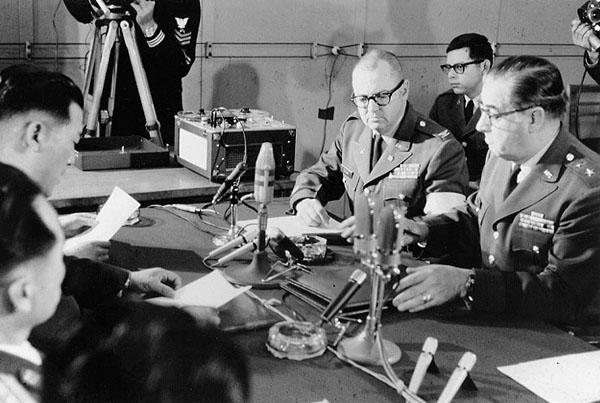
Today, "Pueblo", moored to the bank of the Taedong River - one of the main attractions in Pyongyang. Interestingly, by the way, that the vessel was seized in the Sea of Japan, and now stands in the capital. How it got there - a mystery. In 2008, the US Senate demanded that the DPRK return "Pueblo", but it is hard to believe that the Koreans are willing to lose this magnificent trophy.
Ella Bikmurzin
Koreans are willing to lead tours of the "Pueblo" and talk about the details of the incident. Photos (Creative Commons license): John Pavelka
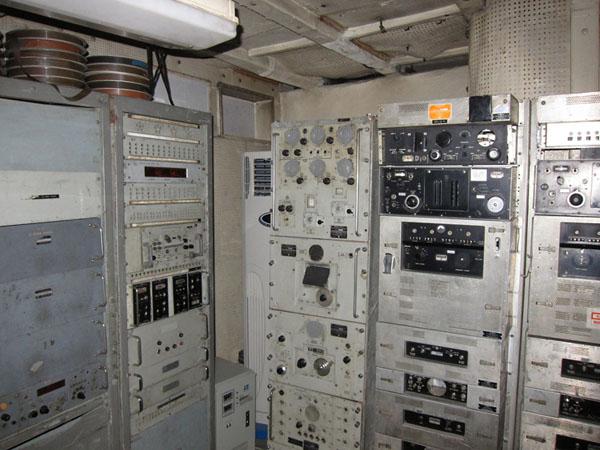
Source:
All last week the world's attention was again focused on the Korean Peninsula: Yonphёndo near the island in the Yellow Sea, where the disputed dividing line between North and South Korea, there was an armed incident - North Korean military shelled a South Korean island, the Southerners fired back. Calls on Russia to exercise restraint, China offers "six" return to the discussion of the problem of denuclearization, the White House demands that the DPRK "to cease hostilities," and some politicians even talked about the fact that "the time has come to change the regime in North Korea." It has been 65 years since the liberation of Korea from Japanese invaders in 1945, this small peninsula remains essentially problematic region, where time and again into conflict. And about the details of some of them becomes known only decades later. Thus, the incident with the American ship "Pueblo", which occurred in 1968 and almost turned around a major armed conflict involving the United States and the Soviet Union, spoke only five years ago.
January 23, 1968 by North Korean radio broadcast the news of the shootout in the Sea of Japan between the American ship "Pueblo" intruded into the territorial waters of the DPRK and the Korean patrol boats. It is also reported the coordinates of the scene and 39 ° 17'4 '' s. w. and 127 ° 46'9 '' in. d. As the crew of "Pueblo" was the detention of "stiff resistance", the Koreans opened fire. Several people were injured, one killed, about eighty captured. However, the ship was seized by dozens of small arms, anti-aircraft machine guns, thousands of bullets and grenades, a large quantity of spy equipment.
In general, the North Korean naval patrols were known for their aggressiveness, in the case of suspicion they opened fire first, and then negotiated, with whom they deal. In 1960, for example, the DPRK Navy mistakenly fired on Soviet research vessel. Usually this kind of misunderstanding - a violation of warship internal waters of any state - resolved quickly and quietly through diplomatic negotiations. But in the story of "Pueblo" load a completely different scenario.
Today, the American spy ship "Pueblo" captured by North Korean naval patrol in 1968 - one of the main attractions in Pyongyang. North Korea is incredibly proud that Americans humiliated and forced to bear an official apology when those rescues captured by the team. In 2008, the US Senate demanded the return of the ship, but it's hard to believe that the Koreans are willing to lose this magnificent trophy. Photos (Creative Commons license): David Stanley

On the same day, January 23, US Ambassador to Moscow, Llewellyn Thompson (Llewellyn E. «Tommy» Thompson Jr., 1904-1972) met with Deputy Minister of Foreign Affairs of the USSR Vasily Vasilievich Kuznetsov (1901-1990) and on behalf of his government requested to assist in the return of the vessel and crew illegally arrested in neutral, he emphasized waters. For Soviet diplomats it was a surprise - Korean comrades are not considered properly inform them about the details of the incident; all that was available at the time - the mean Pyongyang radio message.
It should be borne in mind that at that time, relations between Moscow and Pyongyang were pretty cool, the reason for it - incipient tension between China and the USSR. The Chinese have criticized the foreign policy of the Soviet leadership, accusing him of conspiring with imperialism and rastsenivaya as a betrayal to withdraw the missiles from Cuba. North Korea's leaders have risen to the same position. The United States did not have diplomatic relations with North Korea, however, to resolve the issue of the captured ship, Soviet diplomats advised the Americans to appeal directly to the leadership of North Korea, and our ambassador in Pyongyang was ordered to urgently inform Koreans about the treatment of Thompson and find out further plans Kim Il Sung (1912-1994) regarding this unfortunate incident.
Secret Mission "Pueblo»
Instead of quickly hush up the scandal, through diplomatic channels, Koreans behaved altogether unexpected - the morning of 24 January to Korean radio was handed the captain's record confessions "Pueblo» (USS Pueblo AGER-2) Lloyd Mark Boucher (Lloyd Mark Bucher, 1927-2004) , which speaks directly to the invasion of the vessel into the territorial waters of the DPRK to keep it illegal intelligence activities. A few days later there were also reports of the press conference given by the members of the team for the Korean journalists, where they made their apology over the incident.
Easy cargo ship "Pueblo" at No. FP-344 was launched on April 16, 1944. Until 1954, it was involved in the supply of US troops in the Philippines, after which it was placed on temporary sucks.
Captain "Pueblo" Lloyd Bucher did everything I could, just to avoid a meeting with the North Korean patrol. But the ship did not have enough speed to break away. Noting that on the deck, "Pueblo" burn the documents, the Koreans opened fire. Today, during a tour of the ship, you can see traces of a shootout. Photos (Creative Commons license): Kristoferb

. Until 1954, it was involved in the supply of US troops in the Philippines, after which it was placed on temporary sucks. Ten years later, I remembered about him and decided to use the program in environmental studies AGER (Auxiliary General Enviromental Research), is actually hiding under this abbreviation ships electronic intelligence. Americans interested in military facilities on the territory of the DPRK, the USSR and China: A fixed number of ships, the location of the radar, listen to the radio in order to identify points of command, communications and other military facilities. In 1966, "Pueblo" was renovated: the cargo holds was converted into living quarters and installed at the stern superstructure, which houses electronic equipment.
"Pueblo" was listed in the United States Pacific Fleet, the crew consisted of 83 people: 6 officers, 75 sailors and two civilians - oceanographers Danny Taka (Dunnie R. Tuck) and Harry Iredale (Harry Iredale). December 18 commander docked in the Japanese port of Yokosuka, "Pueblo" was ordered "classified", which identified the timing, objectives and areas of future activity of the ship in the Sea of Japan. The vessel is required no later than 8 January subside from Sasebo-based, follow the Tsushima Strait in the Sea of Japan, and to be in a designated area from 10 to 27 January. Americans are interested in the activities of the Navy in the area of North Korea Chongjin ports, kimchaek, Wonsan and islands Mayando. All of this information was needed in order to calculate whether it is possible "Vietnamese version of" the war in other parts of Asia.
Declassified information caused damage to the reputation of President Johnson: Not only that, with the knowledge of his administration's military intelligence was engaged in illegal activities, as it turned out, the security intelligence command has been neglected, exposing them to unnecessary risk: a dedicated cover for "Pueblo" is not provided, campaign staff officers qualified as "non-hazardous", the ship did not have funds for the destruction of confidential documents and equipment in case of seizure of the ship.
Place of capture "Pueblo". Photo: U.S. Naval Historical Center

Games Kim Il Sung
After the recognition of Boucher Koreans accused the Americans of spying and demanded a public apology and guarantees that this will not happen again. Responding to wait long - the same day Johnson with the approval of the National Security Council announced the urgent mobilization of a reserve Air Force and the US Navy's total number of 14,600 people. US and South Korean forces were put on high alert, nuclear aircraft carrier «Enterprise» and escorts - sent to the coast of Korea from Okinawa to South Korea was moved several dozen fighter jets the United States. The capture of the American vessel in peace time - unprecedented slap in the face, which can not be left unnoticed. Americans have demanded the immediate return of the vessel and crew and apologize for his internment in neutral waters.
On the same day the US ambassador in Moscow, handed a message from President Johnson's Council of Ministers Chairman Kosygin, expressing the hope that the Soviet government is using all its influence to convince Pyongyang to immediately release the crew of "Pueblo". Finally, Soviet diplomats managed to get some clarification from the Koreans - January 28 during a meeting with the Soviet ambassador Kim Il Sung became clear that the Koreans did not occur exactly fix the place of detention vessel. It became obvious that the interpretation of what is happening Pyongyang is not accurate; ship apparently was not captured in the territorial waters, and it just exacerbates the situation of the DPRK.
During the same meeting, Kim Il Sung made it clear that Pyongyang does not want war, and seeks to resolve the situation peacefully. A similar attitude was adopted by a positive - but subsequent events have caused confusion in the Kremlin: two days later the North Korean government sent a letter containing the request of the DPRK to provide immediate military and other assistance with all means at the disposal of the Soviet Union means if Korea will be in a state of war. It said also that the United States may at any time to go on a military adventure in Korea, so North Korea is forced to prepare for a response.
Photo documents found on board the vessel and presented as proof of the Koreans. These documents confirm that the "Pueblo" still violated the territorial waters of the DPRK, however, before it was caught. Photo: U.S. Naval Historical Center

There was every reason to require such support - the fact that between the Soviet Union and North Korea July 6, 1961 for a period of ten years, was signed a treaty of friendship, cooperation and mutual assistance. One of his points was: if one of the parties to armed attack by any State, the other party will immediately render military and other assistance with all means at its disposal. The conditions were tough, no consultation and agreement prior to military assistance, were not provided. By chance, a week before the incident with the "Pueblo" in the Soviet Union came to the conclusion that it is necessary to revise the interpretation of the treaty that the country did not have an automatic involved in undesirable military conflicts. A series of conditions are met: North Korea should not be an agent provocateur of the armed conflict, should not be involved in the conflict under a contract with a third party (China, for example) should not involve the Soviet Union in the conflict with the aim of uniting the country and certainly before we give military aid must undergo diplomatic consultations. January 16 this concept of interpretation of the treaty has been approved, it is going to discuss with the Korean side, but did not have time to do it.
In Korea, the situation continued to escalate. Speaking on the occasion of Army Day, Kim Il Sung said: We do not want war, but we have it and are not afraid. In the capital, began a partial evacuation of the population, has repeatedly declared air raid, the company worked with faults, observed blackout night - cars, for example, went with the headlights off.
The talks between the Americans and the Koreans were without success. Some insisted on apology, others will not hurry to bring them. In addition, the Koreans had tried to organize an exchange of crew "Pueblo" for being in South Korean prisons, leftist politicians. This proved impossible, because in the relations between the US and South Korea appeared chill - the latter expressed dissatisfaction with the very fact of negotiations and an attempt to find a compromise with the DPRK.
Many photographs taken by the Koreans, the crew members, "Pueblo" show bulging middle finger - "Hawaiian good luck" as they explained not understand the significance of this gesture Koreans. In this picture a special "friendliness" showed Angelo Strano (Angelo Strano), second from right in the front row. Photos from the archives of the association

Peaceful conflict resolution, and made every effort to promote in Moscow - Kim Il Sung was invited to the consultations, however, citing the tense situation in the region, he did not find it possible to accept this invitation. But a meeting with Brezhnev was sent to the Minister of National Defense Kim Jang Bong. In Moscow, he clearly formulated the attitude of the USSR to the incident: it's time to turn out the crew of "Pueblo" and cease to escalate the situation. The most important was the question of military assistance under the terms of the 1961 Treaty. Brezhnev specifically focused on the fact that the contract is defensive in nature and in its content and meaning is intended to serve as an instrument of peace in the Far East. During the meeting, the Korean side for the first time was presented a new interpretation of the document.
Many experts are inclined to believe that this conversation in the Kremlin, played a decisive role in the "Pueblo". It became clear that the release of the crew - a matter of time, but eventually the Koreans just did not want to rush. It happened only 23 December 1968, 11 months after the seizure of the vessel. February 3, 1969 Newsweek came out with a portrait of Captain Lloyd Boucher and removal of "Who is to blame?" On the cover. In relation Boucher was conducted an internal investigation, but before the court martial is not reached.
Another interesting point in this story - to become familiar with the technique of espionage, which was stuffed with "Pueblo" in Wonsan a delegation of Soviet specialists in the field of electronics. Korean friends for a long time drove them by the nose - walking their museums, theaters, showing the sights - but when it came to represent the interests of the equipment, it turned out that the Cuban and Chinese comrades already there to work, and dismantle all that was left after the seizure of the vessel. Perhaps it was a kind of revenge for the North Korean weakness - they believed in Pyongyang. The publication of the results of the Korean conflict, interpreted originally: uncompromising stance opposed to Pyongyang's cowardly position of Moscow, did not dare to detain an American ship in the territorial waters of the USSR, and then capitulated to the United States, betraying the interests of North Korea - as well as the interests of Cuba in 1962.
In the history of the American ship did not quite clear the behavior of the leaders of the DPRK remains. Generously distracting statements about his quest to solve the question of the world, every day they continued to fan the conflict situation. Many historians believe that this behavior is the result of the fact that Pyongyang felt completely safe under the protection of the Kremlin and believes that if something "big brother" stand up - especially when offenders unfriendly Soviet power. It is also possible that this behavior was due to the desire to score political points: Americans make a formal apology - it's like that put them on their knees for the second time as it was understood in Pyongyang.
December 22, 1968. The US and the DPRK signed the document on the return of captives. Since the beginning of the incident was exactly 11 months. Photo: U.S. Navy

Today, "Pueblo", moored to the bank of the Taedong River - one of the main attractions in Pyongyang. Interestingly, by the way, that the vessel was seized in the Sea of Japan, and now stands in the capital. How it got there - a mystery. In 2008, the US Senate demanded that the DPRK return "Pueblo", but it is hard to believe that the Koreans are willing to lose this magnificent trophy.
Ella Bikmurzin
Koreans are willing to lead tours of the "Pueblo" and talk about the details of the incident. Photos (Creative Commons license): John Pavelka

Source:




